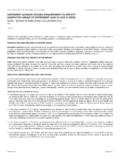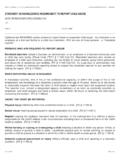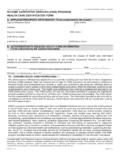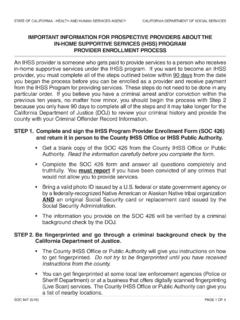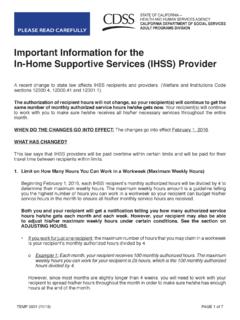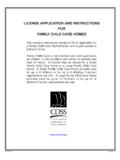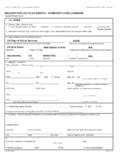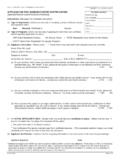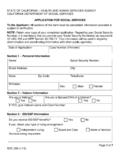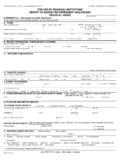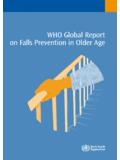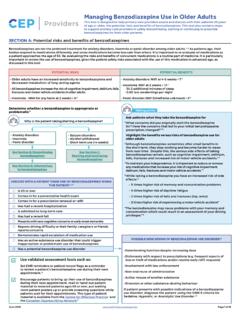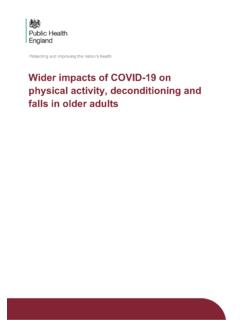Transcription of Falls and Older Adults
1 IHSS Training Academy 1 Falls and Older Adults More than one in three people age 65 years or Older Falls each year. The risk of falling and fall -related problems rises with age. Each year, more than million Older Adults go to emergency departments for fall -related injuries. Among Older Adults , Falls are the number one cause of fractures, hospital admissions for trauma, loss of independence, and injury deaths. Fractures caused by Falls can lead to hospital stays and disability. Most often, fall -related fractures are in the person's hip, pelvis, spine, arm, hand, or ankle. Hip fractures are one of the most serious types of fall injury. They are a leading cause of medical problems and death among Older Adults . Only half of Older Adults hospitalized for a broken hip can return home or live on their own after the injury.
2 Osteoporosis, a disease that involves loss of bone mass, increases the chance of hip and other fractures if a person Falls . Fear of Falling Many Older Adults are afraid of falling. This fear becomes more common as people age, even among those who have not fallen. It may lead Older people to avoid activities such as walking, shopping, or taking part in social activities. Muscles and bones can weaken over time without the physical activity that comes with doing daily tasks or exercise. As a result, a person could become more not less likely to fall . Causes and Risk Factors Falls do not "just happen," and people do not fall because they get Older . Often, more than one underlying cause or risk factor is involved in a fall . As the number of risk factors rises, so does the risk of falling.
3 Many Falls are linked to a person's physical condition or a medical problem, such as a chronic disease. Other causes could be safety hazards in the person's home or community environment. IHSS Training Academy 2 Muscle weakness One of the most important risk factors is muscle weakness. Older people with weak muscles are more likely to fall than are those who maintain their muscle strength, as well as their flexibility and endurance. Balance and gait are other key factors. Older Adults who have poor balance or difficulty walking are more likely than others to fall . These problems may be linked to a lack of exercise or to a neurological cause, arthritis, or another condition that might be treated or managed. Postural hypotension Blood pressure that drops too much when standing from lying down or sitting can increase the chance of falling.
4 Might be a result from a drop in blood volume, dehydration, or certain medications. It might also be linked to diabetes, Parkinson's disease, or an infection. Some people with postural hypotension feel dizzy when their blood pressure drops. Other people do not feel dizzy, even if their blood pressure drops a lot when they get up. Slow reflexes Reflexes may also be slower than when younger. The increased amount of time it takes to react may make it harder to maintain balance when starting to fall . Foot problems Painful feet, and wearing unsafe footwear can increase the chance of fal ling. Backless shoes and slippers, high-heeled shoes, and shoes with smooth leather soles are examples of unsafe footwear that could cause a fall . Sensory problems can cause Falls , too.
5 Having numb feet may mean a person will not sense where they are stepping. IHSS Training Academy 3 Eye sight Not seeing well can also result in Falls . It may take a while for eyes to adjust to see clearly when moving between darkness and light. Other vision problems include poor depth perception, cataracts, and glaucoma. Wearing multi-focal glasses while walking or having poor lighting around the home can also lead to Falls . Confusion Even if it is only for a short while, confusion in Older Adults can sometimes lead to Falls . For example, waking up in an unfamiliar environment may make a person feel unsure about where they are. When a person feels confused, it is best to wait for a few minutes for him/her to clear the mind before trying to get up and walk around.
6 Medication Medications cause side effects like dizziness or confusion. Drug interactions can also lead to Falls . The more medications taken, the more likely a person is to fall . People who take four or more prescription drugs have a greater risk of falling than do people who take fewer drugs. Never add or stop taking medications without talking with the doctor first. Ask the doctor if changes in medications could lower the risk of Falls . All Falls should be reported to the doctor. A fall could be a sign of a medical problem such as an infection or a cardiovascular disorder. It could also suggest that a chronic ailment, such as Parkinson's disease or dementia, is progressing. Adapted from Falls , National Library of Medicine. Retrieved from , October 2013.
7
